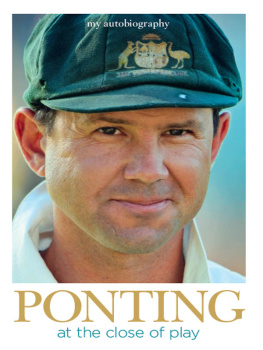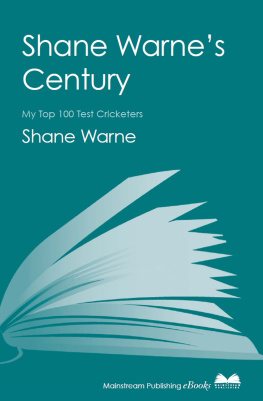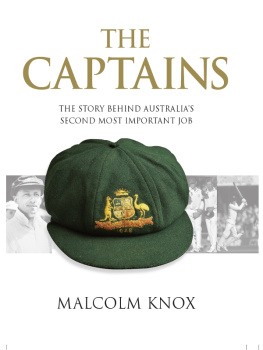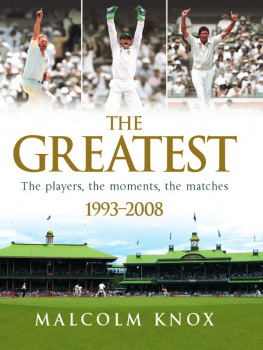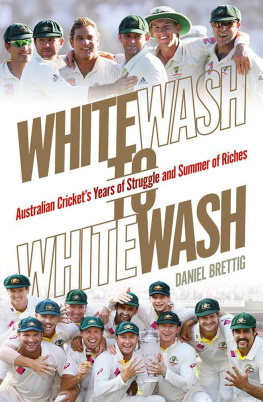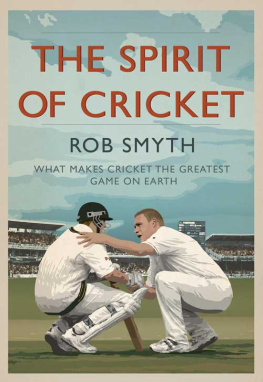For all my supportersin the team, in the crowd and especially in my family. In a year of ups and downs, the backing I received from Rianna, Emmy and those closest to me was unwavering, for which I am extremely grateful.
One of my favourite memories of the Ashes tour is from Headingley, straight after our win there, when Rianna and Emmy joined me on the ground. The victory was brilliant, one of the most decisive Ive been involved in, and having them there to share the experience with me made it even better.
As he has done in previous years, Ricky Ponting kept notes pertaining to all the significant events and issues that occurred in Australian cricket from the time he gave the Bradman Oration in August 2008 to the final ODI on the 2009 Ashes tour. During that time and immediately afterwards, he and I went through that material, and also considered a number of radio interviews and countless internet and newspaper reports, including columns he wrote for the Australian and the London Telegraph, to produce in a diary formatnot a day-by-day account; rather, a few days at a timehis take on another remarkable year of cricket. The result is this book.
Ricky and I are very grateful that in a year in which he won his first Formula One Grand Prix, Mark Webber was able to take the time to write the foreword for this diary. We also appreciate the support given to us by some notable people at Cricket Australia: Peter Young, Philip Pope and Lachy Patterson. We are grateful for the constant backing we received from Rickys manager James Henderson and the entire team at DSEG, and from everyone at HarperCollins.
The statistics, scores and averages that appear through the diary and at the end of the book were derived from a variety of sources, including three excellent websitescricinfo.com, howstat.com: the cricket statisticians and cricketarchive.com.
Geoff Armstrong
September 2009
Foreword
BY MARK WEBBER
IT WAS LATE IN 2008, a few days after I had been discharged from hospital having broken my leg, when a friend of mine got in touch with me and said that Ricky Ponting would like to come and say hello to me in Melbourne. This was the first time I had met Ricky, although because Im sports-mad I have followed him and the side for years. In our discussions we not surprisingly talked sport, the beloved media and the most prized possession in cricket: the Ashes. After he left, I thought to myself, that is a real Australian. Just how I like them: not a huge amount of small talk, a very down-to-earth bloke.
Although our sports are very different, the same qualities are needed to be successfulthe extended levels of concentration, ability to perform under changing pressures and the gift of being able to anticipate your rivals tactics.
Im a very passionate supporter of the Baggy Green, but Im in no position at all to say that we should have taken a spinner into the last Test at The Oval for the Ashes in 2009. However, I certainly box my corner, sticking up for our Australian cricket side, especially at Red Bull Racing F1 where unfortunately more than 400 Poms work. And, no surprise, they now all automatically love cricket!
I was in Australia last summer when we got rolled over by the Saffers, but was stoked with the reply of the Aussies in the return series in South Africa a few weeks later. It was great to see the smile off Dale Steyns face, who for some reason I took a strong dislike to, but who could well be a good bloke. Having travelled so well in South Africa, I thought we would be in great nick to do very well on the lush pitches of the UK, but unfortunately the Ashes series didnt quite go the way I expected. In total, we scored more runs and took more wickets but still lost. As always, there are key stages in top sporting events where that blade needs to go deep into the jugular. The last hour of the first Test at Cardiff is a prime example of how, during this series, the Aussies were unable to do that.
One of my greatest highlights was attending the Lords Test match, where Ricky invited me into the Aussie dressing room. To be able to see one of my favourite teams at the Home of Cricket is something Ill never forget. It was when I was in the room, seeing all the guys from this team together, that it really hit home to me just how huge the transformation our national team has gone through in the last few years has been. I felt young with the 2005 Ashes squad when I visited them; this time I felt old.
I wish Ricky and the team all the success possible in the future and Ill continue to be totally one-eyed when it comes to our boys competing. See you at the Boxing Day Test at the G!
Mark Webber
September 2009
Introduction
BY RICKY PONTING
IF I EVER NEEDED a reminder that the Ashes is the biggest thing for an Australian cricketer, the year of cricket from September 2008 to September 2009 provided it. In the space of 12 months we played a sequence of Test series and tournaments where, in different circumstances, any one of those series or tournaments could have been rated the major event of the cricket year. First, we went to India, where cricket inspires so much passion, for a four-match Test series. Then we had Test series home and away against South Africa, who as I write this in late September 2009 are the No. 1 ranked team in both Test and one-day international cricket. In June, we played in the second ICC World Twenty20 tournament. Right now, we are just hours away from the start of the Champions Trophy, the second biggest limited-overs competition in our sport.
However, for me and my team-mates, the Ashes series, played between June 8 and August 23, stands out so clearly. We knew from day one that in most peoples eyes it was the measuring stick as to whether our year would be a success or not. It represented the chance for me and my team to make history, to establish our own Ashes legend. The interest these Test matches generated, in England and Australia, was phenomenal and we knew, though we were a long way from home, that our fans desperately wanted us to reverse the loss we suffered in 2005. Our team four years ago featured some of the biggest names in the game, such as Shane Warne, Glenn McGrath, Matthew Hayden, Justin Langer, Jason Gillespie and Damien Martyn; this time, we were much younger but the pressure and the expectations were the same
Captains Diary 2009 is the story of this year in the life of the Australian cricket team. Strictly in terms of wins and losses, it wasnt a great 12 months but regardless of where we played or whom we played, we gave ourselves strong opportunities to claim every series. We played 17 Tests in all, but only at Mohali, Delhi, Cape Town and Lords were we never in a position to force a win. Too often, though, we would put in a really bad session or blow the big moment, and a game might be lost. It became a year of what might have been.
At Bangalore, in the first Test of the India series, we needed to bowl the home team out on the final day but couldnt, and the game ended in a draw. One more wicket at Nagpur and we might have been a chance, but instead MS Dhoni and Harbhajan Singh batted us out of the game. In Perth, we set South Africa more than 400 for victory, but they got them. At the MCG, South Africa were 7184 in reply to our 394 but recovered to win. We were a wicket away from nailing the first Ashes Test by an innings. When we needed a fighting performance at The Oval, less than two weeks after our pace bowlers had blown England away at Headingley, we lost eight wickets in a session. In each instance, we just couldnt sustain our best form when the pressure was really on, even though every time we had played really well in the previous session or (in the case of The Oval) the previous Test to get ourselves in a position to prevail.
Next page

